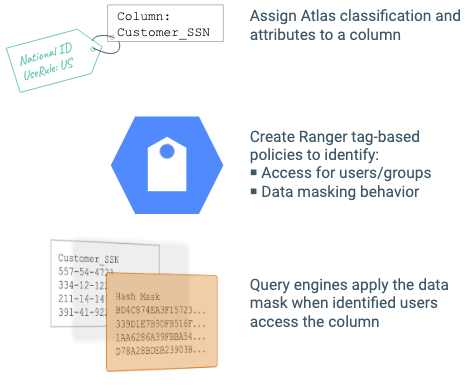Atlas classifications drive Ranger policies
Ranger policies can use tags to identify data; Atlas classifications are pulled into Ranger as tags.
You can use Atlas classifications to drive data access control through Ranger. Ranger offers both resource-based and tag-based access control policies. Using metadata tags rather than specific resource names gives you flexibility and allows access controls to apply immediately to new data assets without requiring administrator intervention.

You can use Atlas classifications to control user access to data assets by using Atlas classifications to define Ranger tag-based access-control policies. Ranger tag-based policies ensure that services such as Hive and Impala control user and group access to specific data assets. Ranger policies can have services apply masks to column data, so users see results such as partial data or anonymized data. To make this work, you define classifications in Atlas; associate the classifications with data assets, including databases, tables, views, and columns; then define policies that act on the data assets tagged with the Atlas classifications.
Some of the ways you can use classifications include:
- Add attributes to Atlas classifications to define separate behaviors for separate contexts. For example, you could mark columns as “National ID” and apply a policy based on that information. You could add an attribute to the “National ID” classification that describes which the rules to apply to the display of the national ID, such as “Apply Rules From”:“EU” or “Apply Rules From”:“JPN”). Ranger policies can use the attribute value to apply different mask patterns to the data.
- Atlas lineage can propagate classifications from one column to columns created later from the same data. When classifications are propagated, the Ranger policies built on these classifications apply to the new location of the data. No intervention is required to ensure that the access controls on the original data are applied to the new copy.
- If Ranger is set up to deny access to new data except for the owner, you can use tags to reveal this data (access only to classified data).


